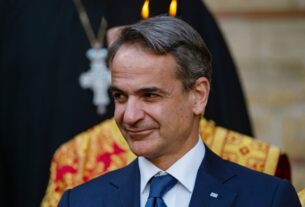ROME — In July 1992, a 15-year-old schoolgirl rang the doorbell at her local branch of the Youth Front, a far-right student movement in Rome, and asked to be let in.
The all-male group of radicals inside met her with bemusement, as she put forward her application to sign up to their cause. But, gradually, the girl earned their acceptance, taking on one leadership role after another, in her rise through the ranks.
Thirty years later, Giorgia Meloni is on course to become Italy’s first female prime minister, at the head of a right-wing coalition that polls suggest will win power in Sunday’s election.
Her rise is the story of a country choosing an outsider, after the collapse of the government run by Mario Draghi, the godfather of Europe’s economic establishment.
If Meloni’s Brothers of Italy party does emerge with the biggest share of Sunday’s vote, it will represent a huge national gamble at a precarious time — the warning lights on Italy’s economic dashboard are flashing as Europe teeters on the brink of recession, while war rages at the EU’s border.
As the leader of the European Union’s third biggest economy, Meloni will have a powerful role in shaping the bloc’s responses to these crises as they unfold. So many in Brussels and capitals beyond will be asking who she really is. What shaped her values? Where does she come from? How does Meloni think?
The answer, in part, lies among her friends and allies from those early days in Rome’s Youth Front. Many members of the original group are now senior figures in the Brothers of Italy. Some are set to join Meloni in running the country.
On that summer’s day in 1992, Meloni must have seemed an unlikely right-wing radical. She came from the staunchly left-wing neighborhood of Garbatella in Rome. Schools like hers and universities in the area were dominated by the left. Merely belonging to the right was a revolutionary act.
“None of us could have ever, even momentarily, have imagined what the polls say could happen,” said Nicola Procaccini, who joined the youth front contemporaneously and is now a Brothers of Italy MEP.
According to Meloni’s own account, the trigger that drove her to join the Youth Front was the assassination that same day of anti-mafia prosecutor Paolo Borsellino. But what cemented their commitment to the cause, according to her comrades, was a fervent patriotism — and an impulse to rebel.
In her book, “I am Giorgia. My roots, my ideas,” Meloni claims that her leftist teachers turned her final year exam into a kind of political show trial, until she threatened legal action. “Clearly we were rebelling, as most students were on the left,” said Procaccini. But their motivations were “the same as today, although more radical … love and anger for our country, and the way it has been reduced.”
ITALY NATIONAL PARLIAMENT ELECTION POLL OF POLLS
For more polling data from across Europe visit POLITICO Poll of Polls.
The local branch of the Youth Front group became known as “The Seagulls,” after Richard Bach’s cult novella, “Jonathan Livingston Seagull.” Like Jonathan, they were outsiders who came together for a greater purpose.
Many of the Seagulls had complicated family lives and were looking for an alternative family, in Meloni’s view. Her own father, who voted Communist, had abandoned their family.
Membership of the Seagulls was not for part-timers. Their politics “was an all-consuming” experience that took over your whole life, including relationships. For one event, activists were told to get their phone books and call friends outside politics, Procaccini recalled. “We got our phone books, but none of us had friends who were not in politics.”
The group fought violent turf wars against activists from the left, often resulting in members getting badly injured. Giovanbattista Fazzolari, now a senator and one of Meloni’s closest advisors, said: “All of our generation ended up spending some days at the hospital. I was treated for wounds, a broken arm. This was part of our normality.” The activists tried to protect the girls, Procaccini said, but Meloni even back then did not want special treatment.
Procaccini claims that, when not fighting left-wing activists, the Youth Front members had a surprising intellectual curiosity about communist and socialist political theory: At weekends, away in forests and monasteries, they sang songs by left-wing artists and appreciated left-wing writers such as Che Guevara, “because we shared their fight against indifference”, said Procaccini.
But more than political texts, they were influenced by fantasy novels, often about underdogs uniting to triumph over evil. Meloni’s favorites included Stephen King’s “The Stand,” and the novels of Tolkien, whose texts had been appropriated by an earlier generation of the Italian far right.
Irreverent and sweet
Despite the masculine world Meloni inhabited, at times being a woman helped her. Her then-mentor Fabio Rampelli, now a Brothers MP, chose her to run as a provincial councillor, “because she was irreverent and sweet at the same time, and was perfectly placed to dispel the image of hard, pure far-right skinhead.”
When Meloni became Italy’s youngest ever minister at 31, she still lived at home with her mother, although she had always worked to contribute to the house. She shunned the chauffeur-driven government car and took her Mini to parliament instead.
She claims that the abandonment by her father has left her with a sense of inadequacy, which drives her to work incessantly. For Fazzolari, “the great strength of Giorgia is that she never feels fully at her ease. She studies and prepares things that for others would be routine.”
Meloni’s political ideology rejects progressive values and embraces identity politics. It’s built on defending national borders, national interests and the traditional family. She has always been staunchly anti-drugs and anti-abortion, although she insists she wouldn’t ban abortion. She resents what she sees as the elitist left’s dominance of public discourse and the Italian establishment — in particular academia and the justice system. “They call us monsters,” she has said. Such complaints are common to right-wing politicians across the world.
A tendency to frame her work in militaristic terms does little to allay the concerns of critics and opponents on the left, who trace a direct line from Italy’s fascist past under Mussolini to the current day Brothers of Italy. She has referred to herself as a soldier, and politics as her “mission.” She counts herself lucky to have a partner and child.
She puts utmost importance on consistency and remaining faithful to her political roots, worrying often about how the 15-year-old Meloni would judge her decisions now, Procaccini said: “She cares a lot that that emotion that brought her to do politics as a teen is not corrupted.”
In her book, Giorgia Meloni praised Italian leaders such as Bettino Craxi and Silvio Berlusconi for standing up to the U.S. | Alberto Pizzoli/AFP via Getty Images
This perception of constancy has served her and the Brothers well during a turbulent few years of unwieldy coalition governments, a pandemic and economic uncertainty, helping her take votes from right-wing rival the League party.
But on foreign policy, Meloni has shown herself willing to evolve and adapt. In 2018, she celebrated Vladimir Putin’s election victory as representing “the unequivocal will of the Russian people.” And in her book, published last year, she praised Italian leaders such as Bettino Craxi and Silvio Berlusconi for, in her view, standing up to the U.S.
Since the invasion of Ukraine, anxious to be seen by the international establishment as a moderate, Meloni has unreservedly aligned herself to the U.S. and NATO.
The wolf pack
Yet while there is room for flexibility when politics requires it, Meloni relies on a tight-knit group of allies who have been with her for years. Her sister and brother-in-law are also in the party. The circle, in the words of one former MP, is “closed.” At times, loyalty and shared battles count more than experience.
Meloni’s office team has to cope with her foibles and exacting standards. She writes only by hand in capital letters on squares — and demands that anything she has to read is printed out, on a single page, in Segoe font size 12.
At home, too, she is a neat freak who color codes her mostly monochrome wardrobe. Having been bullied for her weight as a teenager, she is now a self-confessed sports “addict,” always choosing hotels where she can run. If she stops, her mind “becomes a kind of pressure cooker,” she wrote in her book.
This inner circle is vital to understanding Meloni the leader. When she needs to take a decision, she does not do so alone. First, she consults those who know the subject, said Fazzolari. In her book, she quotes Kipling: “The strength of the wolf is the pack. The strength of the pack is the wolf.”
For Fazzolari, the strength of the wolf pack is that they have known each other for 30 years. “Over this time, we have all found out each others’ fortes and weaknesses,” he said. “Gradually there has been a selection of who is suited to be leadership and who isn’t.”
Yet Meloni’s loyalty to her tribe’s roots also risks holding her party back from fully transitioning into moderate conservatives. Meloni refuses to remove the flame associated with fascism from the Brothers’ logo because it is part of their history.
Yet governing in a coalition inevitably requires tradeoffs. If she wins Sunday’s election, Meloni won’t be an outsider anymore. When political reality strikes and the time comes to compromise on her ideals, a 15-year-old schoolgirl will be watching at her shoulder, with the harshest judgment of all.





